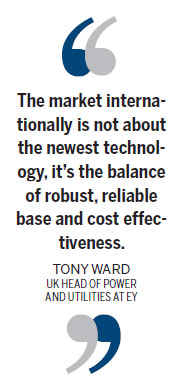Skills base puts power in firms' hands
Updated: 2014-06-13 07:53
By Cecily Liu (China Daily Europe)
|
|||||||||||
Chinese Nuclear energy expertise is there for the buying
One of the UK's foremost independent energy experts says China is perfectly positioned to become the major force in global nuclear power development.
Tony Ward, UK head of power and utilities at EY (formerly known as Ernest & Young), says that China has great experience delivering projects in a timely way, managing the cost of delivery, and building up the supply chain that's needed for managing a program.
"No other country in the last 20 or 30 years has had a nuclear program as extensive as China, and as a result some countries have lost their capacity to deliver either the supply chain or project management skills," he says.
One benefit China gains from a large new nuclear program is the ability to build up a skills base and supply chain needed for new nuclear plants, which many Western countries once had but is now losing, he says.
"If I think back to the 1970s and 1980s, the United States, France and UK had programs of building multiple reactors in their countries, which enabled their industries to build up a supply chain, the capability and knowledge. But if a country only builds one reactor over 10 years, it just becomes a project, and doesn't allow the supply chain to grow. People then lose the track record and capability to do it."
As the nuclear industry is highly complex and requires sophisticated technology, Western countries that have not often built nuclear plants almost need to prove themselves again, while emerging economies like China, South Korea and Russia are quickly building up their capability.
In addition, Chinese companies' ability to invest in the nuclear fuel cycle, including investing, building and operating, also gives them an advantage of certainty.

"Countries able to bring a more complete package are proving to do better in the international market, which means the ability to finance, build and operate stations and take away the expended fuel. For a lot of markets around the world it takes away some of the risks and challenges associated with owning and operating the plant."
Chinese experience in owning and operating nuclear plants can also help bring down the cost of financing a project, because banks would be more confident in financing their projects, he says.
"If the potential providers of capital haven't had experience in owning and operating some of these reactors and technologies, (banks) would have a much more critical view, are less likely to lend money and more likely to charge more interest."
Although many nuclear plants in China are based on Western technology designs, typically the European pressurized reactor design, China is also increasingly building using indigenous nuclear technology.
Ward believes exports of Chinese indigenous nuclear technology could help many countries that find the Western design too costly.
"The difference between the European pressurized reactor design and Chinese indigenous design is that EPR is large in scale and more complex in design and cost.
"When I think about many of the countries looking to buy nuclear power stations, they're not looking to buy the most complicated and most expensive."
While Western technology is leading, many countries may still opt for Chinese technology that is known to be robust, has been built several times before and is known to be reliable, he says.
"The market internationally is not about the newest technology, it's the balance of robust, reliable base and cost effectiveness."
When eventually Chinese nuclear technology design is well accepted in international markets, China can bring its nuclear supply chain internationally to support its technology, he says.
"There will be more value they can access. It's thinking about the supply chain. If you end up having a constant demand for all the components, you begin to get economies of scale through the manufacturing facilities. You need many reactors of the same design built."
Despite China's strong domestic nuclear industry, the challenge is to make its nuclear industry global, says Ward, adding that this needs to be done step by step, rather than internationalizing the whole supply chain at once.
"It is quite often difficult to win a big project internationally for the whole supply chain."
Instead, Chinese companies should initially participate in international nuclear projects as a part of the supply chain, proving their strength in smaller tasks and eventually winning projects that utilize their strength for the overall project, Ward says.
cecily.liu@chinadaily.com.cn
(China Daily European Weekly 06/13/2014 page13)
Today's Top News
China finds way to play in 2014 World Cup
Protocol targets sex violence
Premier all business on Europe trip
Poland-China train on maiden trip
Iraq facing 'mortal threat' from militants
China, Italy boost ties
Brazil averts strike before WCup
Red meat 'linked to cancer'
Hot Topics
Lunar probe , China growth forecasts, Emission rules get tougher, China seen through 'colored lens', International board,
Editor's Picks

|

|

|

|

|

|





